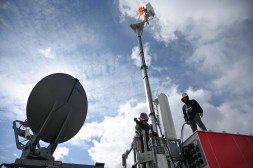Del Toro: Navy ‘very concerned’ about future spectrum-sharing decisions

NATIONAL HARBOR, Md. — On the heels of the White House’s new National Spectrum Strategy, the Navy’s top civilian said there is still apprehension about a future in which the Pentagon would have to share portions of the spectrum with civil and commercial users, as well as any potential secondary consequences that doing so would create.
“We’re very concerned, obviously, about what the future holds in terms of sharing the spectrum. We have made it quite obvious that, given the enormous investments that have been made — particularly in the Aegis Weapon System, for example — that it’s not just a Department of the Navy concern. It needs to be a national concern,” Secretary of the Navy Carlos Del Toro told DefenseScoop on Tuesday on the sidelines of the Association of Old Crows annual symposium.
Del Toro’s comments come just one month after the Biden administration released its National Spectrum Strategy, which promoted the concept of dynamic spectrum sharing between federal and non-federal users as one way to address a growing demand for spectrum access.
Part of Biden’s plan called for a study of five frequency bands for potential repurposing, including the 3.1-3.45 GHz S-band used by the U.S. military. The directive follows a separate study that determined the Pentagon could share its spectrum with non-DOD users if interference mitigation features and frameworks were established.
The Navy is a major stakeholder in decisions about domestic and international spectrum use, as the service has invested billions of dollars in systems that are specifically designed to operate on the Pentagon’s spectrum band — including radars equipped on the Aegis Weapon System and other capabilities used for ballistic missile defense, Del Toro said.
Given those costs, “we cannot simply share valuable spectrum space that we require to be able to perform our [electronic warfare] missions at sea, and certainly near the continental United States,” he said.
Del Toro’s concerns are part of a larger dispute between the Pentagon and the commercial telecommunications industry over access to the department’s allocated portion of the spectrum. Although the DOD has used its band for decades, advancements in wireless technology and a lack of greenfield spectrum have prompted the U.S. government to explore ways that band could be shared with commercial users.
“With the rapid pace of technological change, we find ourselves sharing key parts of the spectrum band with civil and commercial users … causing congestion in the electromagnetic spectrum and constraining our use to better manage our nation’s approach to spectrum management,” Del Toro said during his keynote Tuesday at the AOC conference.
A key task for the Navy is ensuring the Pentagon understands the service’s spectrum-using equipment and the costs associated with redesigning those systems for a different part of the spectrum or sharing, Del Toro said. He has told lawmakers that it would take an estimated $250 billion to relocate just the Department of the Navy’s systems to a different spectrum band.
The sea services are taking some measures to support the White House’s new spectrum strategy while also ensuring that its equities and concerns are represented in future decisions, he said. Recently, Navy CIO Jane Rathbun held a “DON Senior Spectrum Leadership Summit” with representatives from the Navy and Marine Corps in order to identify the department’s future spectrum needs, Del Toro noted.
In addition, the Department of the Navy has delegates currently attending the International Telecommunications Union (ITU) World Radiocommunication Conference 2023 (WRC-23) in Dubai. During the international summit, members convene to debate changes to regulations for cross-border spectrum usage.
Del Toro emphasized that it is critical for Capitol Hill to stay informed of the Pentagon’s national security requirements and the Department of the Navy’s overall strategy as decision makers weigh future considerations about spectrum management.
“This isn’t just about creating new jobs. I’m proud of our president [and] proud of our administration for creating the jobs that they have created,” he told DefenseScoop. “But, when it comes to the issue of sharing spectrum, we have to be able to carefully come together and understand not just the primary consequences of decisions that they make — but the secondary consequences as well.”






